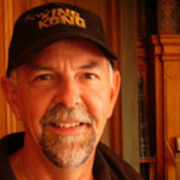
Jamie Selkirk
Jamie Selkirk won an Academy Award for his editing of The Return of the King (2003), and followed it with another heavy hitter: King Kong. Selkirk has played a part in editing all of Peter Jackson's previous features, apart from Forgotten Silver. His CV also includes boy and turtle tale The Silent One, and episodes of landmark television dramas Winners & Losers and The Governor.
Selkirk's film career began in the late 1960s, when he saw an ad for floor crew at the New Zealand Broadcasting Corporation in Wellington. "The floor crew held the cables of the big camera so they didn't get caught under wheels. After about three months of cabling you went up the ladder and became a camera man." Selkirk had begun operating studio cameras when a car accident left him incapacitated for a long period. He switched to "the more sedentary role" of editing.
As a trainee editor at the NZBC, Selkirk cut newsreels, current affairs, documentaries and dramas, including the opening and closing episodes of historical epic The Governor. After 13 years in state television, he launched his own post-production company, Mr Chopper.
In 1976 he edited two episodes of pioneering anthology series Winners & Losers, one of the earliest independently-made Kiwi dramas to screen in primetime.
Selkirk worked on a variety of productions, from dramas to commercials. The first feature he edited was pioneering gay film Squeeze (1980), written and directed by Richard Turner.
In the early 1980s, Selkirk edited Pacific Island tale The Silent One for director Yvonne Mackay, was a sound editor on The Scarecrow, and helped expand historical TV drama A Woman of Good Character to feature-length, with help from a young scriptwriter named Fran Walsh.
Selkirk first worked with Peter Jackson on his debut feature, boys' own movie Bad Taste (1987). Selkirk supervised the film's complex postproduction, which involved replacing virtually the entire soundtrack, and co-edited the film with Jackson. The final edit ran to 2300 shots, more than the grading computer at the National Film Unit was then able to handle.
Selkirk performed similiar duties on both the puppet follow-up Meet the Feebles, and Jackson's mainstream breakthrough Heavenly Creatures. For the latter, Selkirk took away a 1995 New Zealand Film and TV award for Best Editing.
As Jackson's films have expanded in scale and budget, Selkirk has added another bow to his work - producing. He began by associate producing Braindead in 1992 (in which Selkirk has a cameo as a father at the zoo) and was one of the main producers on the ambitious The Frighteners. At that time, The Frighteners shooting schedule ranked as the longest continuous shoot in New Zealand filmmaking history.
Earlier, in 1994, Selkirk had joined with Jackson, Richard Taylor, Tania Rodger, George Port and late producer Jim Booth to form Weta, which would grow to become New Zealand's largest special effects facility. The company would expand to include Wellington's Camperdown Studios, where Selkirk spent many years as the facilities manager.
Selkirk was a close collaborator with Jackson on the Lord of the Rings trilogy. He served as supervising editor and sounding board on the first two films, and helped produce them. He then became the main editor of what is long likely to remain one of the most complex editing jobs undertaken in New Zealand: The Return of the King (2003), whose extended edition lasts 251 minutes.
For his editing work on Return of the King, Selkirk won an Academy Award, and an Eddie from the American Cinema Editors society. He followed it by editing Jackson's three hour, multi-million dollar remake of King Kong (2005).
Selkirk's other credits as editor include science fiction thriller Typhon's People (1993) and rugby tale Old Scores (1991), both made for television, and underworld thriller Should I Be Good? (1985).
Selkirk also has a number of producing credits on short films. In 1998 he produced Larger Than Life, which was a precursor to 2002 spider movie Eight Legged Freaks. Both films were directed by New Zealander Ellory Elkayem.